The UK Government has issued a report stating that diesel and petrol vans could be phased out when it comes to last-mile delivery.
The Department for Transport (DfT) wants to shift last-mile deliveries from diesel vans to all-electric light commercial vehicles – and even to cargo bikes. Its Road to Zero strategy, launched in June 2018, states that this transition away from diesel could reduce urban congestion and improve air quality where it is most needed.
The DfT is calling on commercial fleet operators to outline any challenges or barriers to delivering goods via more sustainable vehicles – and what incentives fleets would require to help them replace diesel delivery vans.
Transport minister Jesse Norman said: “Last-mile deliveries have been transformed in recent years by the growth of home deliveries driven by the boom in internet shopping. This has led to a marked rise in van traffic.”
According to the latest road traffic estimates, van traffic increased by 4.7% to 49.5 billion vehicle miles in 2016. This upward trend is exacerbating issues faced by towns and cities across the UK, such as improving air quality and reducing congestion.
Glasgow has announced it will implement a low emission zone by the end of 2018. Birmingham, Derby, Leeds, Southampton and Nottingham are required by law to introduce clean air zones by the end of 2019, with several other local authorities expected to follow suit.
London will introduce an ultra-low emission zone from April next year, while Oxford is considering introducing a zero emission zone in 2020, banning diesel and petrol vehicles altogether from six roads in the city centre.
Fleet operators can apply for an Office of Low Emission Vehicle (OLEV) grant for 20% of the purchase price for an eligible all-electric van, up to a maximum of £8,000 per vehicle. However, the higher cost of EVs is not the only consideration for fleets. Other concerns include charging infrastructure and how to get the most out of battery-powered commercial vehicles.
How we can help
Are you thinking about deploying all-electric vans for last-mile delivery? Trakm8 Optimisation was the first fleet scheduling tool which not only accommodates electric vehicles, but helps fleets maximise the benefits of EVs. We have extensive experience in last-mile delivery, working with fleets in a wide range of sectors.
By analysing existing operational data, our fleet optimisation algorithm can identify the best routes and vehicles to switch to EV, which informs the procurement decision and builds the business case. Once a fleet has deployed ultra-low emission vehicles, Trakm8 Optimisation ensures that these high-cost assets are used to their full capacity, delivering a rapid return on investment and delivering the biggest possible reduction in total fleet carbon emissions.
Most importantly, Trakm8 Optimisation works by optimising the entire fleet, not just the battery-electric vehicles. Our algorithms are proven to reduce total fleet mileage while improving productivity and vehicle utilisation – meaning you benefit from even bigger savings.
In addition, Trakm8 Optimisation can be fully integrated with our telematics solution, providing vehicle tracking, driver behaviour analytics, geo-fencing, vehicle health alerts and optimisation all from one user-friendly platform.
If you would like to find out more about our optimisation solutions, fill out the short form below and one of our team will be in touch. Alternatively, call us on 0330 311 5157 or email us at info@trakm8.com.
Source: https://www.trakm8.com
CUT COTS OF THE FLEET WITH OUR AUDIT PROGRAM
The audit is a key tool to know the overall status and provide the analysis, the assessment, the advice, the suggestions and the actions to take in order to cut costs and increase the efficiency and efficacy of the fleet. We propose the following fleet management audit.




